-
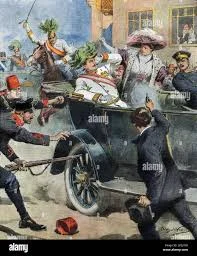 The assassination of the Archduke was the initial start of the war.
The assassination of the Archduke was the initial start of the war. -
 American neutrality in WWI was important because it allowed the United States to avoid the destruction of the war, profit from trade, and maintain a position of impartiality for potential peace negotiations.
American neutrality in WWI was important because it allowed the United States to avoid the destruction of the war, profit from trade, and maintain a position of impartiality for potential peace negotiations. -
The German army invaded France with a plan for winning the war in 40 days by occupying Paris and destroying the French and British armies.
-
The sinking of the Lusitania was important because it caused the deaths of 128 Americans and outraged the public, significantly increasing anti-German sentiment and pressuring the U.S. to move away from neutrality.
-
The Battle of Verdun is important because it became a brutal war of attrition, a symbol of French national perseverance, and a turning point that inflicted heavy casualties on both sides, ultimately shifting German strategy and influencing future defenses like the Maginot Line.
-
The Sussex incident is important because it was a major catalyst that led to the United States entering World War I.
-
The Battle of the Somme is important because it is a symbol of the brutal and costly nature of trench warfare during World War I, with over a million casualties on both sides and minimal territorial gains.
-
The Zimmermann Telegram is important because it was a secret proposal from Germany to Mexico to form an alliance against the United States during World War I, which ultimately helped push the U.S. into the war.
-
Germany's unrestricted submarine warfare is important because it was a key factor in the United States entering World War I.
-
The United States' entry into World War I was important because it provided the necessary military and financial power to tip the scales for an Allied victory, shifted the global balance of power, and marked a major turning point in U.S. foreign policy from isolationism to global leadership.
-
The Selective Service Act is important because it has been used to mobilize the military through conscription during wartime.
-
The Espionage Act is important because it is a federal law used to protect sensitive national defense information, deter espionage, and punish those who improperly disclose classified data.
-
The American Expeditionary Forces (AEF) in France were important because they provided crucial manpower that boosted Allied morale and tipped the balance of the war.
-
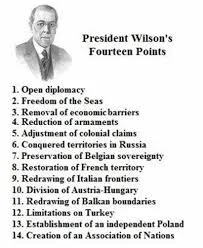 The Fourteen Points were important as a groundbreaking blueprint for a peaceful, just, and cooperative international order following World War I. Presented by President Woodrow Wilson in 1918, the points introduced modern concepts like national self-determination and open diplomacy to replace the old system of secret treaties and imperial rivalries.
The Fourteen Points were important as a groundbreaking blueprint for a peaceful, just, and cooperative international order following World War I. Presented by President Woodrow Wilson in 1918, the points introduced modern concepts like national self-determination and open diplomacy to replace the old system of secret treaties and imperial rivalries. -
 The Spanish flu epidemic is important because it was the deadliest pandemic in modern history, infecting one-third of the world's population and causing more deaths than World War I.
The Spanish flu epidemic is important because it was the deadliest pandemic in modern history, infecting one-third of the world's population and causing more deaths than World War I. -
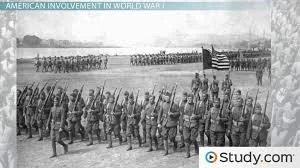 Russia's exit from World War I was important because it allowed the Bolsheviks to focus on the Russian Civil War, temporarily shifted the balance of power on the Western Front by freeing up German troops, and led to a harsh peace treaty that resulted in significant territorial losses for Russia.
Russia's exit from World War I was important because it allowed the Bolsheviks to focus on the Russian Civil War, temporarily shifted the balance of power on the Western Front by freeing up German troops, and led to a harsh peace treaty that resulted in significant territorial losses for Russia. -
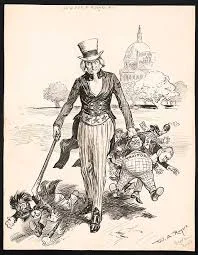 The Sedition Acts are important because they are key examples of government attempts to limit free speech.
The Sedition Acts are important because they are key examples of government attempts to limit free speech. -
 The Sedition Act is important because it highlights the tension between national security and civil liberties, specifically freedom of speech and the press.
The Sedition Act is important because it highlights the tension between national security and civil liberties, specifically freedom of speech and the press. -
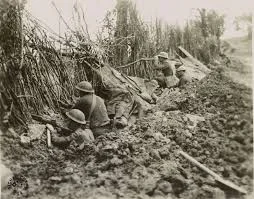 The Battle of the Argonne Forest, also known as the Meuse-Argonne Offensive, was important because it was the decisive final Allied offensive of World War I, which, through the use of a massive American force, ultimately led to the collapse of the German army and the Armistice.
The Battle of the Argonne Forest, also known as the Meuse-Argonne Offensive, was important because it was the decisive final Allied offensive of World War I, which, through the use of a massive American force, ultimately led to the collapse of the German army and the Armistice. -
 Armistice Day is important because it marks the end of the fighting in World War I on the Western Front at the 11th hour of the 11th day of the 11th month in 1918, bringing an end to a devastating conflict that resulted in millions of deaths.
Armistice Day is important because it marks the end of the fighting in World War I on the Western Front at the 11th hour of the 11th day of the 11th month in 1918, bringing an end to a devastating conflict that resulted in millions of deaths. -
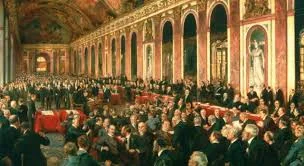 The Paris Peace Conference and Treaty of Versailles are important because they officially ended World War I, reshaped the map of Europe by creating new nations and redrawing borders, and led to the creation of the League of Nations.
The Paris Peace Conference and Treaty of Versailles are important because they officially ended World War I, reshaped the map of Europe by creating new nations and redrawing borders, and led to the creation of the League of Nations.